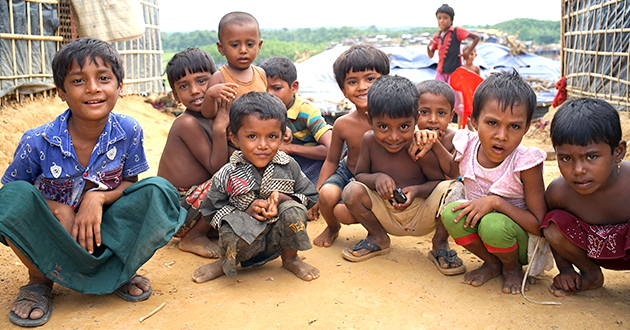News & Updates
How is WHO preparing Cox’s Bazar for monsoon season?
01 June 2018

The Rohingya refugee camp in Cox’s Bazar has started to experience intermittent flooding as the first rains of the monsoon season fall. The camp is home to approximately 1.3 million people.
The World Health Organisation and other partners from the health sector are focusing on further strengthening the preventative and contingency measures in place to minimise the negative health effects of the monsoon.
Dr Bardan Jung Rana, WHO Representative to Bangladesh, commented:
In May, nearly 1 million people were targeted in a mass cholera vaccination campaign, including refugees, their host community and those living in close proximity to the camp. The campaign was the second cholera vaccination programme in the camp and hopes to minimise the risk of cholera during flooding.
“WHO and health sector partners are working with Bangladesh government to maintain life-saving primary and secondary health services for Rohingya refugees and their host communities in the ongoing rainy season. Heavy rains, floods and cyclone are expected to further deteriorate the already suboptimal water and sanitation conditions in the overcrowded refugee camps, increasing the risk of infectious disease such as acute watery diarrhea, cholera, hepatitis, dengue fever and malaria, among others”
In addition, 22 diarrhoea treatment centres, with 597 beds, and hundreds of oral rehydration points have been set up across the camp.
WHO have also positioned 16 mobile medical teams (MMT) on the ground who are prepared for immediate deployment in the case of an infection outbreak, landslide or flooding. MMT’s consist of a doctor, a paramedic or nurse, a midwife, a dispenser and a protection officer. Each member of the team has been trained to deliver immediate lifesaving services.
As part of the preparations WHO have also stockpiled drugs, medical devices and equipment to meet the health needs of 200,000 people for three months. This includes 75 tonnes of cholera treatment.
To minimise the risk of water borne disease outbreaks, WHO has been supporting the testing of drinking water and providing water filters to health facilities, rehydration points and family filters, with priority going to pregnant women.
Earlier this week WHO also re-trained health sector partners in the camp on early warning, alert and reporting systems with a focus on water borne diseases and acute diarrhoea.
If you’d like to stay informed on the latest updates in aid and development, please sign up for the AIDF newsletter.
Image credit: WHO